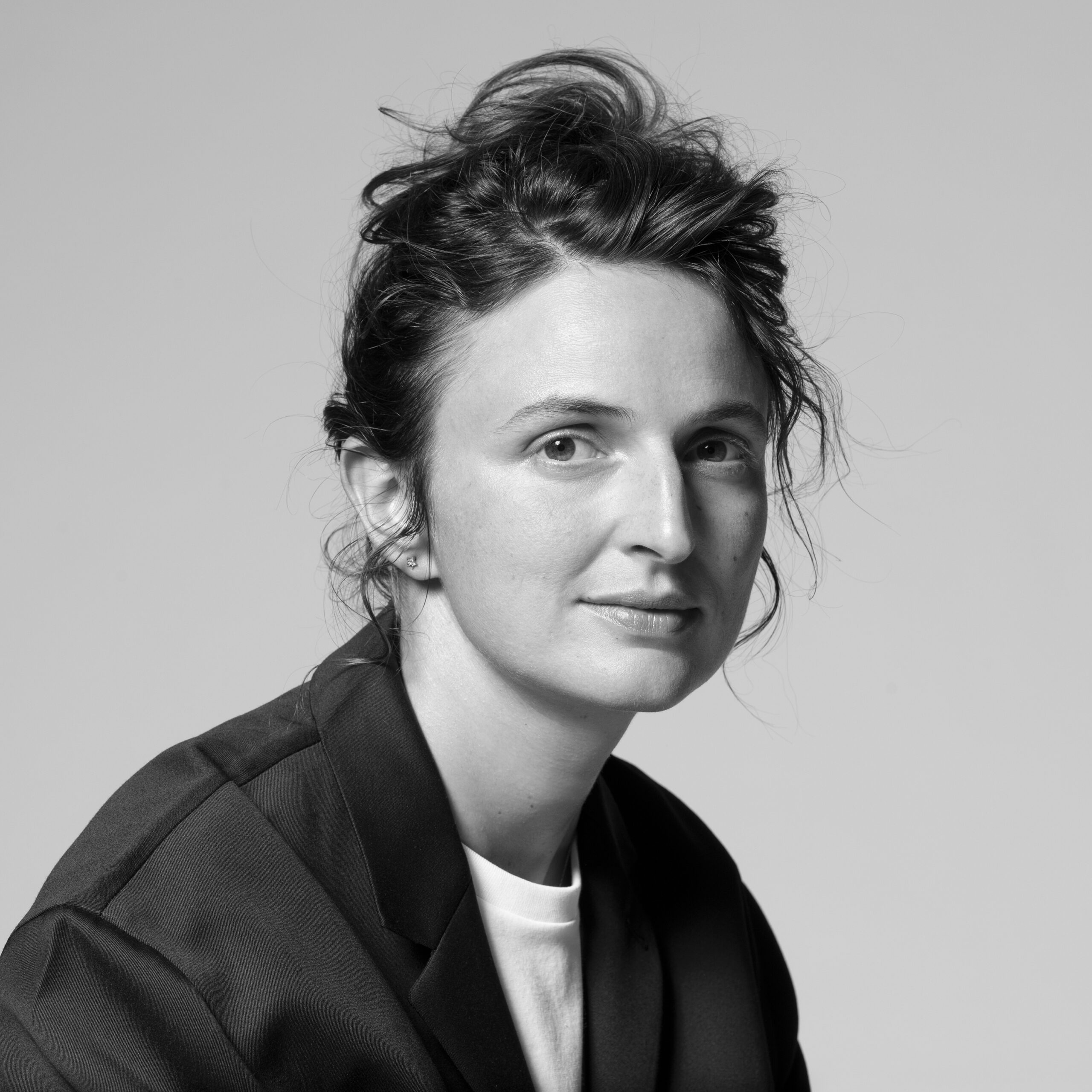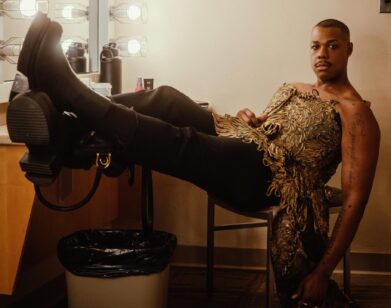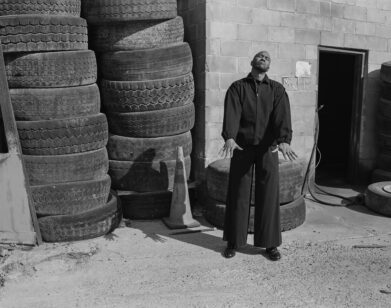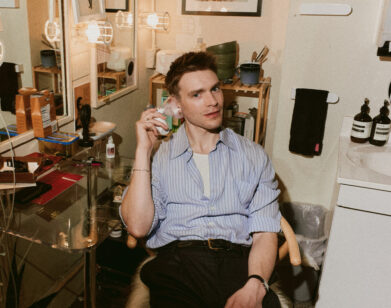NYFF
Alice Rohrwacher Invites Us Into Her Sacred Park of Monsters
In central Italy, there sits a mythic garden filled with monsters, Sacro Bosco (sacred garden), where as a child Alice Rohrwacher roamed, making sense of the garden’s intricate sculptures and how they’d landed in her world. This sense of childlike wonder of the sublime, in concert with the familiar, is at the center of this award-winning Italian filmmakers oeuvre—from Cannes best screenplay winner Happy as Lazzaro, which turned Italian tobacco farms into a playground of mischief, to this year’s Cannes competition feature La Chimera, which follows an English tomb-raider blessed (or cursed?) with a connection to Etruscan tombs her films constantly surprise.
At a midtown hotel near Lincoln Center where La Chimera premiered the night before at the New York Film Festival, we had a lively lunch and spoke about her poetry, language, breath, and Josh O’Connor. For a filmmaker so lauded, it was refreshing to discover how vital a childlike curiosity has remained to her practice, and how, all these years later, walks through Sacro Bosco inform every step she takes a storyteller.
———
JEREMY O. HARRIS: I’m so enamored with your film and your writing in general. Your directing is so sumptuous. I wonder how you came to develop this poetic sense you have when you tell a story?
ALICE ROHRWACHER: Poetic? It’s not that my thinking sort of comes from above. It’s really from below. It’s something that I just sort of happen across in my walk through life. Something that I experienced, something that I find along the way, something though that is alive and adventurous. And the attempt is not to make something that’s perfect, but maybe to take the road not taken, to go through the forest and to find something that matters and something that will make a film that’s alive. And this is really what matters to me the most. I think breadth is really a very important aspect of my poetics, that the scene breathes in the way that everything breathes. And this is something I shared with my director of photography, Hélène Louvart. On the one hand, we have the body of the scene, the breadth of the scene. On the other, we have the fairytale, the fiaba, and this is the most real thing in my storytelling, because fairytales are born from reality and they return to reality, but they return to reality in a distilled form. And these fairytales are not something that I try to exploit in any sort of way, but they are the most real thing in my poetics.
HARRIS: That’s beautiful. You have such deep patience with the scene. How did the work this time, utilizing an English-speaking actor speaking in Italian for the first time, disrupt or enhance that?
ROHRWACHER: Thank you for this question. It’s a very interesting one. I’m used to working with people who always have to learn another language, by which I mean not just an English actor who’s learning Italian, but maybe a shepherd who’s sort of learning about a scene, older people who are learning about something that is happening. There’s always a language that has to be learned, and the language that I’m referring to is the language of film. Teaching a non-professional actor how to be within a scene is still the same kind of problem. Every time I’m making a film and I come across a situation, it’s a little tricky, and I start asking myself, “Why in the world am I doing this? Why didn’t I choose to do something easier?” Then the light comes on for me and I realize I enjoy this fatigue. I enjoy this struggle. And this is true for Josh [O’Connor], who’s learning about Italy. Everyone is learning about something, and they’re taking a step toward a world that they did not know.
HARRIS: That’s beautiful. When you’re crafting a story that’s this epic, who do you look to as a source of inspiration? I feel so thrilled that the amazing filmmaker, Eliza Hittman, pointed me to your work. It opened my eyes to this new way of telling an Italian story because so many Italian filmmakers that I have met are men. I wonder if there were any filmmakers in your life that sort of inspired you to go down these journeys?
ROHRWACHER: I mean, I don’t feel like I’m the proprietor of anything, really. All my words are sort of shaped, all my words, my voice, my gestures, my imagination, are shaped by centuries, really. They are educated from afar. And these are the utensils that we borrowed from all of humanity, really. So I can never say that I discovered something, only that I felt it. And before me, someone probably felt it, and after me, someone will. My references are very broad, and my films have been nourished by me, myself, my imagination, and my dreams. My memory has been nourished by many different films, and by novels, by this very complex inheritance that we have. Personally, I am from the 20th century, and I feel a sort of duty being between these two worlds, the 20th and the 21st century, a duty to be a witness to the world that’s gone by and to talk about the ties between the two.
HARRIS: That likens being a filmmaker to being a tomb raider, in some small way.
ROHRWACHER: I would’ve preferred to be an archeologist. But I am a tomb raider. We like to dig and we like to find something that’s hidden. And the film is maybe a mechanism for digging. However, like these tomb raiders, we belong to a much larger industry. We’re like the gears inside of that. And we have to remember that even though we feel free, this freedom is often an illusion. Because, regardless, we are working within an industry, a collective hypnosis. And I think in a world like today, in an era of artificial intelligence, where we have more and more specialization, the most human element you can find is an error, or a mistake. That is the kind of breach, the break within reality that opens up the world and shows us another world. As independent filmmakers, it’s also our duty to keep our attention alive to that breach.
HARRIS: I am very in line with that thinking. A couple of years ago, I wrote something for Italian Vogue that was all about us searching for and reaching towards failure in art. Perfection is a trap, but failure is liberation. If you reach towards failing, you can reach towards the sublime. And I think that that’s something that’s missing in a hyper-capitalistic society. Capitalism makes us think that we have to create perfect little products for people, but it is those imperfections that sort of energize the next generation to fill the gaps that we couldn’t fill.
ROHRWACHER: I would say the figure with whom I identify the most is the tightrope walker, but not the one who walks across like it’s nothing, but one who is hesitating, who is sort of wavering a little bit, and despite almost a few missteps manages to make it across. That is the figure that I identify with.
HARRIS: I love that. Your sonography is so lush, as is your sense of costuming. I often feel that when people present a sort of magic realism or fairytales on screen, they work really hard to separate it from the world we’re in. And yet your worlds feel very much like ours, but just a little askew. What is that process of world-building for you?
ROHRWACHER: Well, in order to answer your question, first I have to talk to you about a very important place in my life, which is close to where I grew up. This is the Park of Monsters. It was built in the 16th century in Bomarzo. Maybe you saw an image of this in The Tree of Life.
HARRIS: Oh, wow.
ROHRWACHER: There’s a huge stone monster with the mouth, and the mouth is a door.
HARRIS: Yes, yes, yes.
ROHRWACHER: This is in the park. It’s part of the park. In the 16th century, it was built by the Orsini family. In that period, it was very fashionable to have these parks and gardens. They decided to build a park of monsters. And as a child, the stone monsters really frightened me. But there’s one in particular that I was drawn to, and it’s of a little house, and it’s perfect. You go in, there’s a little fireplace, there’s a table. There were chairs that used to be there, but not anymore. But the strange thing is it was a little bit tilted. So, when you go in, it’s leaning off to one side. And when you leave, your whole vision has changed. It sort of distorts your picture of reality, and this is something that I try to do in my filmmaking, to give you something that is very real, like that little house, but a little bit askew, because it opens up your vision. And this is something that I share with my collaborators, my sonographer, and my costume designer. They’re not mine, of course, they work for themselves. But this is a trick, to find something that’s very close to reality but a little bit inclined, and find something in this reality that is pure.
HARRIS: Oh my gosh. Oh, I love that. Bomarzo.
ROHRWACHER:Yeah.
HARRIS: I have to visit it.
ROHRWACHER: You have to visit.
HARRIS: It’s stunning. I think my time is almost up, and I know I barely asked you about the movie, but it was mainly because I didn’t want to ask you questions other people had asked you.
ROHRWACHER: And I gave the answer that is special.
HARRIS: Where’s your curiosity taking you next?
ROHRWACHER: Another movie. Another hopeless movie. One of my favorite moments of cinema is the beginning of 8 1/2, when the character of the director wakes up after the dream and there is this man in his room, opening the door. He says, with a big smile, “What are you preparing next? Another hopeless movie?” I think it’s just perfect, no?
HARRIS: Yes. Your stories fill me with so much light. And as a writer, it makes me want to take new paths. Like the moment in the film when the woman who’s a part of the writer group just sort of steps out and has her own aside. I was like, “Oh, you made your own rules.” That excites me. And it gives me a lot of license, because I often think there are too many rules about what an American can do.
ROHRWACHER: Yeah. Thank you very much.
HARRIS: Thank you.







